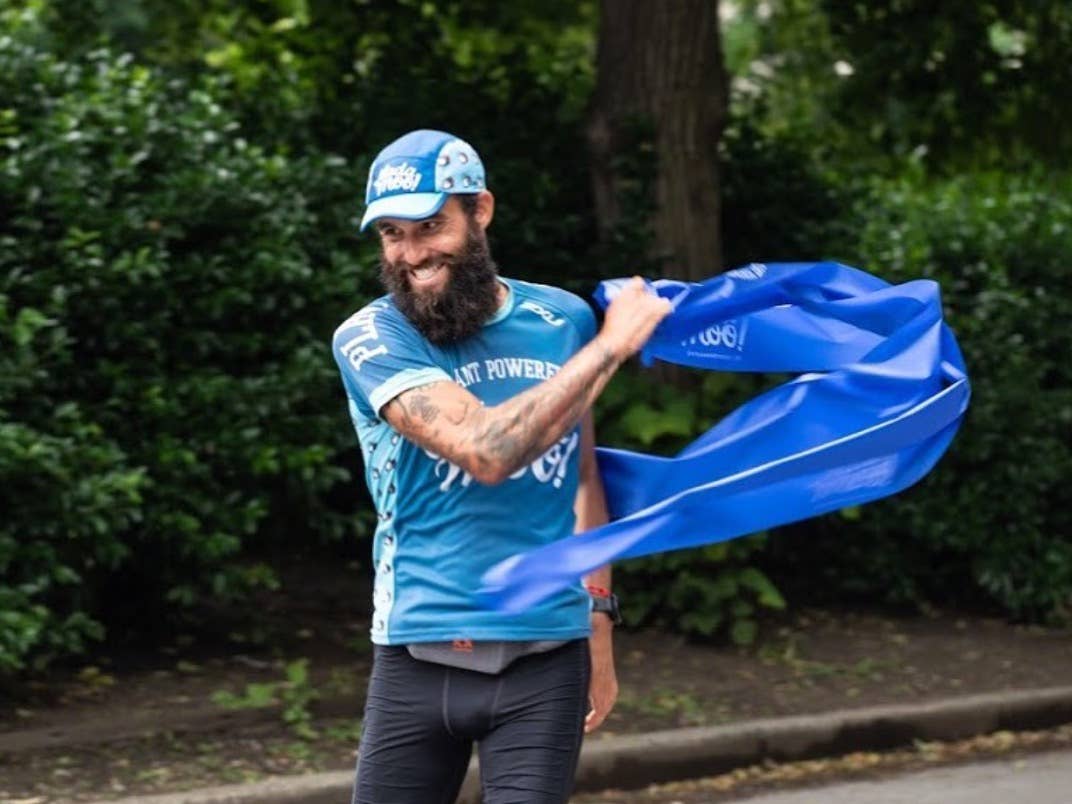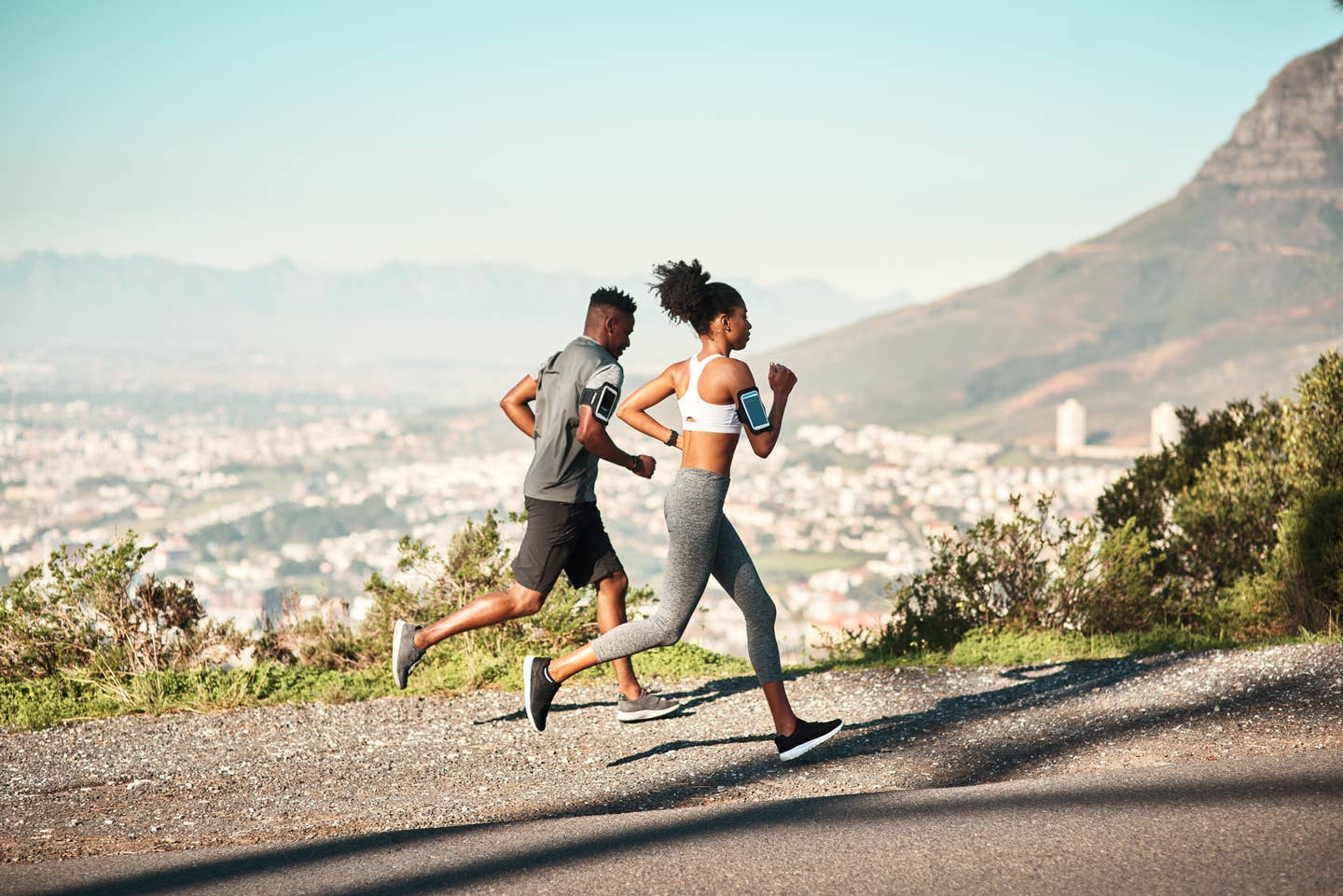
Robbie Balenger Ran Across America on a Vegan Diet: “It Changed My Life”
When Robbie Balenger decided one day that he would become the plant-based Forest Gump, he never anticipated how the journey would change his life, physically, mentally, and emotionally. "It changed my entire identity," Balenger says since although he was the 330th person to run across the United States, and ran the full distance on a vegan diet. To be able to cover the 3,200 miles in 75 days without any animal protein, proved yet again that you don't need to eat meat to be an elite endurance athlete.
The 2019 cross country journey began two years after Balenger left his job running a pizza shop in Austin (he was not plant-based at the time). He moved to Denver with his fiancee, where he hoped to find a new passion and job. In 2018, a year after he had settled in Colorado, to his surprise, he still "felt lost" but had a desire to pick-up the hobbies that had made him feel his happiest in the past. One of those was running, something he had always enjoyed. He first started by signing up for a few marathons and ultras, to get back on his A-game. For a race in 2018, he flew to Copper Cannon, Mexico to run a marathon, where he met Patrick Sweeney, who inspired him to change his life. In their brief conversation at the race, Sweeney, who is also vegan, mentioned that he had just finished a run across the country in a "chill" manner, Balenger recalls. Sweeney was the first to complete the run on a vegan diet. In that single moment, it dawned on Balenger that he had the ability to do the same thing.
After the marathon, Balenger flew back home and became obsessed with the idea of running from California to New York City, and he wasted no time in starting his training. "I became obsessed with the idea so quickly, and I think that type of intensity is required to pull off something like this." The next morning, he told his fiancee, "I'm going to run across the country." He told her this on March 18, 2019, "I marked my words," Balenger says and exactly one year and a day later he started his run from Huntington Beach. He ended in Central Park on May 29th, 2020, surrounded by well-wishers who wanted to celebrate his accomplishment.
Along the way, he would cross 14 different states and experience all kinds of weather conditions. To complete a run so extreme, Balenger notes that his daily routine was devoted to training, improving his stride, dieting, and searching for sponsorships. He decided to go plant-based eight months before the run, after reading Scott Jurek's book, Eat & Run, a best-seller that highlights the importance of a plant-based diet and athletic performance. Balenger quickly ditched all meat and dairy to reduce inflammation in his body and improve recovery times. He became a firm believer that a vegan diet was the smartest way to train. A few days after eating only vegetables, grains, and legumes, Balenger couldn't believe how energized he felt, and said, "the reason I was so motivated to wake up every morning and train was that I didn't feel any soreness or pain anymore, the way I felt when I was eating meat."
Starting off from Huntington Beach, He Ran All the Way to New York City
On March 19, 2019, Balenger double knotted his sneakers, and started his journey in Huntington Beach California, with a crew driving a camper by his side for his home on the road. Balenger started his route by running north towards Los Angeles, then turned east and ran across Arizona, which he remembers simply as being "boiling" hot, and then headed East through New Mexico, where he faced his biggest hurdle as he began to suffer debilitating shin splints and tendinitis in both legs. He assessed the excruciating pain and feelings of doubt, to the point where he nearly dropped out and considered flying back home. Instead of sleeping in the camper that night, he booked a hotel room and his fiancee flew in to meet him for support and motivation, which was desperately needed. In the morning, he actually felt worse: freezing, sore, and painfully hopeless. But instead of giving up, his fiancee, Shelley, talked him into continuing. "You can't just drop everything you've trained for," she said. She helped push him out the door to get back on the road, to complete the journey he put his entire heart and soul into.
Back on his feet, as Balenger ran east, the daylight lasted longer into the evening. But it was a brutal spring and the weather never seemed to cooperate. He ran through snow, rain, sleet, and as he headed to Oklahoma and crossed the Appalachians, hail greeted him. But so did people. Fans who followed his progress came out to wave and greet him all along the route. Many of them jumped up and jogged next to him for moral support for a few miles. Balneger was having spiritual, life-changing thoughts. As he ran through rural areas with miles of farmland, he felt a personal connection with cows and wildlife. At that moment, he was so grateful for his entirely vegan diet since it checked off all three boxes, It was better for his health and his training; it was safer for the environment and the beautiful landscape, and it afforded the farmed animals a small amount of protection, at least from his consumer dollars.
When Balenger approached Central Park, at last, he ran down Park Drive and as he finished his last few miles, the emotions all came rushing in. What he had just accomplished hit him hard, like a physical wall. He felt down, not happy but sad it was over. He had never thought that accomplishing his goal would leave him feeling depressed but he did. When you work so hard for something for such a long period of time, when it's over you feel like you've lost your identity. What now? What next? Where is the sense of purpose? There were also moments of feeling great, and a new sense of confidence, excitement, and joy that what he had just done will be part of him forever. No one can take that away from him. He will always be the first person to run across the country fueled by a purely vegan diet.
The Beet spoke to Balenger on Zoom, where he shared his entire story, from start to finish. He elaborated on what he eats and how he gets enough protein and calories on a vegan diet, plus he shares what he ate during the run, and the health benefits he felt. Balenger credits his vegan diet with helping him cross the finish line and not give up. He believes that if he had not changed his diet, before the run, he never would have finished, and probably would have given up in that hotel room.
The Beet: You ran across America, what was the motivation or inspiration for doing it?
Robbie Balenger: I came out of a career in the restaurant industry, I felt lost with what I wanted to do next. So, I moved to Denver with my fiance and started running more. I raced in a couple of ultras and marathons and really started refining my food choices. Once I learned about a plant-based diet, and athletes who really believed in the power of plant-based food, I tried it myself and I had a complete gut-check.
My race results and running performance improved significantly when I changed my diet. I then felt like I had more of an altruistic approach to my life. From there, I got really passionate about how food choices affected our well-being and decided what to do next with my life. So, I ran Copper Cannon in Mexico and met Patrick Sweeney who told me he ran across the country in 2018, and I was very impressed because he was such a chill guy, and made it sound attainable. That helped me figure out that I wanted to do the same thing, and I got really obsessed with the idea quickly, which I think is required to pull off something like this. At the time, I was no one in the running world, I was just a guy who worked at a restaurant, so finding sponsorships and getting people to join my journey was my focus.
The Beet: Amazing. Tell us more about the run. When, where, and how did you start?
Robbie Balenger: So on March 15, 2018, I said out loud that I wanted to run across the country. At the time, I've never heard of anyone else running this far except for Patrick and the fictitious Forest Gump. So one day when I came home from a normal run, I told my fiance that I wanted to run across the United States. She looked confused and said, "what are you talking about?" So, I trained for a year and one day and talked to maybe 2 or 3 people who have run across the country. Then, onMarch 16, 2019, I set out in Huntington Beach for the run and eventually made it to Central Park in New York City 75 days later. Every day, I averaged 43 miles and crossed through 14 states.
The Beet: How did you plan your route?
Robbie Balenger: When you do a run like this, you have to plan your route around specific criteria. You have to run on roads with no traffic, and they have to have large shoulders. Now, you can't touch interstates because pedestrians are not allowed on them. There was actually a moment where the road I was supposed to be running on got floated and I jumped on the interstate and a cop pulled me over and picked me up. It's best to plan out a route using Strava heat maps.
I went in a North-East direction but some roads didn't allow that. So I started in Huntington Beach then slipped through California, ran through Arizona, then headed north to New Mexico and Oklahoma, then up toward New York, and finally finished in Central Park.
The Beet: Where did you sleep?
Robbie Balenger: So, I had a crew with me the entire time. They had a camper attached to the van they drove and that's where I slept. My team took good care of me and made sure I was fed and hydrated. I consumed 8,000 calories a day and relied on my 1,000 calorie smoothie to help round-out my calories. It was made with coconut milk, vegetables, peanut butter, and soylent meal replacer. I ran 5-mile increments and stopped to take a water break or refuel. For dinner, I would eat a hearty meal like vegetables and grains, and wake up in the morning and do it all again. The timing of my run varied because as you're heading east in March, the days were getting longer so I didn't need to get up early to maximize daylight. Depending on the grade, each day it would take me around 11.5 to 16 hours to run.
The Beet: How were the weather conditions? It was Spring, right?
Robbie Balenger: I saw it all. Leaving Huntington Beach was beautiful and the weather in LA was spectacular, I caught a beautiful sunrise that looked like a neon sky. Then, I hit Mojave desert and it was boiling hot. When I crossed the highest point of my run in Taos New Mexico, it was snowing. It snowed through Oklahoma then it got really humid around the Appalachian, so I can't think of a type of weather that I didn't see every day.
The Beet: On a personal note, I have to run with music, what did you listen to?
Robbie Balenger: At times, I would run with music and I thought I would get into podcast and audiobooks but I didn't really so I either listened to music or ran with someone else. I had people that would run with me at times for a couple of hours. In California, people would come out and run with me, then it got really rural and I didn't see anyone for a while. As we got closer to the East Coast, people started coming out, like we had a real Forest Gump moment as there were like 5 people running behind me.
The Beet: What was your recovery experience like? This is no walk in the park.
Robbie Balenger: Recovery was not something I anticipated like my assumption was that if you run for 11 1/2 to 16 hours a day, then I would just pass out go to sleep. But, that wasn't the case. In the first seven days, I think I slept about 10 hours and I was dealing with a lot of pain in my glutes and quads. Eventually, we were able to figure out a routine of ways to overcome that. I took Tylenol, CBD, and melatonin. This helped me wind down in the evening and fall asleep. I was really tired the first month but things got easier after that.
I got injured on day 7or 8 and I developed shin splints in my left shin, which lasted five days. I got really scared that I would have to end my run, but I made up my mind that I was going to finish, I didn't have any desire to quit. On day 19, I got tendinitis in my right leg which also really scared me and I wasn't sure if I could continue. I ended up getting over that and on the 25th day, it was super cold, and decided to get a hotel room. It was one of the three times I got a hotel room to rest.
I remember the next day when I woke up in the hotel room, it was 20 degrees out and my fiancee was there at the time. There was no part of me that wanted to leave the hotel room and it took my fiancee to push me out the door to get back on the road. I think that was my lowest point of motivation. That was in New Mexico in a town called Cimarron, just east of Taos.
The Beet: Ok, let's go back a bit. How did you train, and prep your body to run this far?
Robbie Balenger: I broke everything up into three parts essentially. At first, I ran 10 miles every day and took the 15th day to rest. I did that for about four months then I continued to increase my mileage from 70 miles a week to about 100 or 120. Then, in the third part, I ran a 100k route and did a 50-mile race. Two weeks later, I did another race and continued the pattern for about four months. I needed to prove that this kind of mileage was a normal distance for me and I would need to do between 45 to 50 miles a day. Someone told me this years ago, the most beneficial thing that you can do as a runner is to stay consistent.
The Beet: When you made it to New York City. How did you feel?
Robbie Balenger: I definitely have more confidence in myself. Also, I feel legitimized as a runner, that's a really interesting experience. To be perceived as a guy who ran across the country when before I just another person who signs up for a marathon or an ultra and gets really excited about it. Now, it's like having that as my identity is something I really appreciate.
There was a reckoning that happened because when you do something for such a sustained period of time when you finish, you feel like you don't really know what to do with anyone, or who you are. My only focus for so long was training to run a long-distance and running across each state. There was definitely some emotion, like depression and anxiety that hit me right after I finished the run, and it lasted for 6 to 8 months.
The Beet: Let's talk about your diet. When did you start eating vegan?
Robbie Balenger: So it was an interesting transition. In less than a year before I started my run across the US, I switched my diet completely. I would say I was 100% vegan either 6 to 8 months before the run. I knew about athletes who ate plant-based diets and really believed in better performance because of it. Scott Jurek, who's an ultra runner, was one of the vegan athletes I really admired.
I remember when I was at a race, my sponsor at the time was Nadamoo! Dairy-Free Ice Cream and I met a guy who was super stoked about the vegan brand and he asked me to go out for a little shake before the race and I went. I told him that I'm vegan but if there were any social situations where there wasn't an option for me, then I would just eat the food that was there. But, that wasn't the case for this guy, he was super vegan, ad vegan tattoed across his neck. Then, I realized, it was ok to be fully vegan, it made me more confident in my convictions and at that moment I knew where it is I wanted to be, and this is how I was going to operate.
Another thing that helped me make the transition was when I went down to the US Virgin Islands to help with post-hurricane Maria and Erma. I learned about the environmental catastrophe that took place, and the reality of global warming. That helped me refine my food choices because as an individual I want to be part of helping curb climate change and one of the easiest ways to do that is adopting a vegan diet. I found my solidarity in these choices.
The animal rights side also hit me, but much later. While I was on the run across the US, I definitely ran with more cows than people because, in the middle of America, there are lots of land and farm animals. I realized how in tune they were with me and how much of developed dynamic beings they are, and that definitely resonated with me.
The Beet: How do you think your vegan diet affects your athletic performance?
Robbie Balenger: A vegan diet was actually my biggest advantage, from a performance standpoint. Meat causes inflammation, inflammation causes soreness, and if you can eliminate that from the equation then you’re gonna be able to perform better and recover quicker. The reason I could jump out of bed every morning and hit the road was that I didn't have those pains I used to feel before I was vegan. I don't really experience soreness anymore which is part of my ability to run across the country. Also, meat takes longer to digest, and your body uses more energy in the process. I need all the energy I can get and can't waste it on slower digestion.
The Beet: Do you have a mantra or words you live by?
Robbie Balenger: Yes, I do. My mom always told me, you can do anything you set your mind to, and that really stuck with me.
The Beet: What are you working on now?
Robbie Balenger: Outside of running I now focus much of my time on working with Lettuce Grow. At Lettuce Grow we make it easy and fun for anyone to bring healthy, sustainable, and abundant harvests into their home -- with no anxiety or green thumb required! We increase the predictability, reliability, and fun of the grow-your-own experience. This is achieved through our self-watering, self-fertilizing Farmstand which is easy to maintain -- just plug in your plants and the app will help you water, grow and harvest!
More From The Beet






